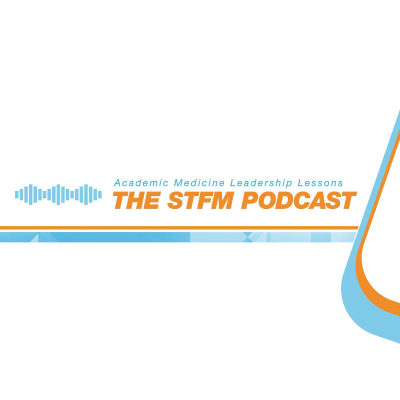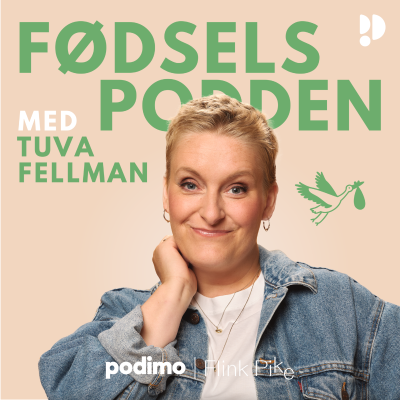
Lytt til STFM PODCAST - Academic Medicine Leadership Lessons
Podkast av STFM
What separates a good leader from a great one? These in-depth interviews with some of family medicine's most influential leaders provide insight into pivotal experiences that boosted leadership skills and provided unprecedented opportunities for personal growth. This series of podcasts explores the development of leadership skills, including clarity, courage, decisiveness, humility, and passion, as a means to facilitating growth during times when healthcare professionals are addressing:• Motivation and Mentorship• Burnout and Transitions• Milestones and Meaning• Barriers and BureaucracyThis series of podcasts is sponsored by the Society of Teachers of Family Medicine (STFM), the academic home for family medicine educators.
Prøv gratis i 7 dager
99,00 kr / Måned etter prøveperioden.Avslutt når som helst.
Alle episoder
69 EpisoderHelping a patient with chronic pain can overwhelm even the most eager residents. Stephen K. Stacey, DO, introduces a transformative approach to whole-patient pain management which partners his osteopathic roots and military background. Dr Stacey guides listeners through the MAGIC model: Multimodal, Active, Goal-based, Interdisciplinary, and Comprehensive care, empowering residents to engage their patients in meaningful, multifaceted treatment. Faculty will gain insights into how teaching MAGIC reshapes resident attitudes, enhances clinical confidence, and creates deeper, more effective interactions with chronic pain patients. Hosted by Omari A. Hodge, MD, FAAFP and Jay-Sheree Allen Akambase, MD Copyright © Society of Teachers of Family Medicine, 2025 Resources: * An Interprofessional Approach to Chronic Pain Management and Education [https://journals.stfm.org/familymedicine/2022/january/awadallah-2021-0260/] - Fam Med. * Improving Chronic Pain Management in a Family Medicine Residency [https://journals.stfm.org/familymedicine/2023/june/traxler-0386/] - Fam Med. Stephen K. Stacey, DO: Dr. Stephen Stacey is the Director of Osteopathic Education for the Mayo Clinic Family Medicine Residency in La Crosse, where he is dedicated to training future physicians in comprehensive, whole-person care. As a skilled osteopathic physician, he specializes in osteopathic manual medicine and holistic treatment for chronic pain, helping patients of all ages achieve better health and overcome barriers to an active lifestyle. Before joining Mayo Clinic, Dr. Stacey served as a battalion and flight surgeon in the U.S. Army. During his service, he deployed to Poland and Ukraine, where he played a vital role in training NATO allies in battlefield trauma care. His military experience has reinforced his deep commitment to patient-centered, hands-on medicine. Outside of his medical practice, Dr. Stacey is an avid outdoor enthusiast who enjoys trail running, mountain biking, and cross-country skiing. Most importantly, he loves spending quality time with his wife and five children. Dr. Stacey attended Kirksville College of Osteopathic Medicine and completed his residency at Family Medicine, Peak Vista Community Health Centers. Link: www.stfm.org/stfmpodcast052025 [http://www.stfm.org/stfmpodcast052025]
Family medicine professionals are deeply committed to providing high-quality care for their patients. However, they also recognize that political decisions significantly impact the communities they serve. In this episode, Nina DeJonghe, Director of Government Relations at STFM, shows us how to turn our passion for patient care into advocacy action. She pulls back the curtain on Congress and its operations, and champions the surprising efficacy of constituent letters. Ms DeJonghe highlights STFM resources to help you advocate at both the state & federal levels, shares ways you can influence national health care policies, and provides a plethora of resources to engage your powerful voice for change in family medicine. Hosted by Omari A. Hodge, MD, FAAFP and Jay-Sheree Allen Akambase, MD Copyright © Society of Teachers of Family Medicine, 2025 Resources: * Family Medicine DEI Advocacy Toolkit [https://www.stfm.org/deiadvocacytoolkit] * CAFM Advocacy Action Center [https://www.stfm.org/about/advocacy/advocacyoverview/] - Voter Voice * Advocacy Scholarship for New Faculty [https://www.stfm.org/awardsscholarships/scholarships/advocacyscholarshipfornewfaculty/overview/] - scholarship to attend the Family Medicine Advocacy Summit [https://www.aafp.org/events/fmas.html] (FMAS) in Washington DC * STFM Advocacy Resources and Key Issues [https://www.stfm.org/Advocacy] * STFM Advocacy Course [https://stfm.org/facultydevelopment/onlinecourses/advocacycourse/overview/] Other Podcast Episodes: * URM JAM Podcast Episode 16: Serve Your Community Through Family Medicine Advocacy with Jehni S. Robinson, MD, FAAFP [https://stfm.org/about/keyinitiatives/antiracism-and-health-equity/urm-initiative/urm-jam-podcast/ep16_shownotes/] * The STFM Podcast July 2022: Family Medicine’s Place in Advocacy with Andrea Anderson, MD, FAAFP [https://stfm.org/publicationsresearch/publications/podcast-ep-pages/stfmpodcast_07_2022/] Guest Bio: Nina DeJonghe, MPP, is a seasoned public policy professional with several years of leadership, legislative, and non-profit experience. As the Director of Government Relations for the Society of Teachers of Family Medicine (STFM), she oversees the advocacy functions for the Council of Academic Family Medicine (CAFM), which comprises the leadership of academic family medicine organizations. Nina liaises with Congress, federal agencies, external organizations, and relevant stakeholders to coordinate efforts that advance family medicine priorities. Her current advocacy efforts address critical issues such as workforce shortages, increasing funding for primary care research, expanding Graduate Medical Education (GME), and enhancing patient accessibility to healthcare services to improve community outcomes nationwide. Nina is a Michigan native. She holds a bachelor’s degree in political science from Eastern Michigan University and a master’s degree in public policy from George Mason University. She has significant success working towards effective policy solutions, thoughtful partnerships, and accessibility to critical funding and resources. She has dedicated her professional career to strengthening marginalized and underserved communities. Link: www.stfm.org/stfmpodcast042025 [http://www.stfm.org/stfmpodcast042025]
Presented by Adrian N. Billings, MD, PhD; Texas Tech University STFM Conference on Medical Student Education 2025 Scott Fields Lecture | Sunday, February 2 2025 In the evolving landscape of American health care, the call to practice and serve in rural communities offers a profound and transformative opportunity for clinicians. This presentation delves into the powerful concept of accompaniment—an approach where physicians not only deliver care but also actively engage with and support their patients and communities. For medical students aspiring to a career marked by meaningful impact, the rural setting offers a unique and inspiring canvas. Rural areas often face significant health care disparities, including limited access to medical resources and specialized care. This context demands a new kind of medical professional — one who is not only skilled in clinical practice but also deeply committed to community engagement and advocacy. The role of accompaniment involves more than just treating illness; it requires a holistic approach to patient care, emphasizing empathy, education, and empowerment. Through accompaniment, physicians forge strong relationships with patients, understanding their unique challenges and needs. This model of care fosters trust and collaboration, leading to more effective and personalized treatment strategies. Additionally, it empowers healthcare professionals to become advocates for systemic changes that address the root causes of health inequities. Embracing a career in rural medicine through the lens of accompaniment offers a pathway to profound professional fulfillment and societal impact. Accompaniment aligns medical practice with the broader goals of social justice and health equity. For aspiring physicians, this approach not only enhances our clinical skills but also instills a deep sense of purpose and connection to the communities we serve. A call to service through accompaniment emerges as a beacon of hope and inspiration, guiding future medical leaders toward a more compassionate and equitable future. Learning Objectives Upon completion of this session, participants should be able to: 1. Describe causes and consequences of rural health disparities. 2. Justify the practice of medicine outside the walls of a health care facility to combat social determinants of health. 3. Value the concept of accompaniment as it relates to a career of service in medicine. Copyright © Society of Teachers of Family Medicine, 2025 Adrian N. Billings, MD: Dr Adrian Billings, of Alpine, Texas, is a National Health Service Corps Scholar alumnus, the chief medical officer of Preventative Care Health Services FQHC in the rural Big Bend of Texas, professor in the Department of Family and Community Medicine, associate academic dean of Rural and Community Engagement, and senior fellow of the F. Marie Hall Institute for Rural and Community Health at Texas Tech University Health Sciences Center. Additionally, he serves as senior fellow of Health Equity with the Atlantic Institute. Dr Billings has been a career-long community physician along the rural Texas-Mexico border of west Texas. He is an elected school board trustee for rural Alpine Independent School District, serves as an officer in the Texas Academy of Family Physicians, and works on the Board of the Association of Clinicians for the Underserved. Dr Billings is passionate about rural health care workforce development and enabling rural borne and educated students opportunities to enroll in health care training programs. Link: https://www.stfm.org/stfmpodcastMSE25Closing [https://www.stfm.org/stfmpodcastMSE25Closing]
Presented by Karen Hauer, PhD; University of California, San Francisco STFM Conference on Medical Student Education 2025 Scott Fields Lecture | Saturday, February 1 2025 Bias in assessment of medical learners presents a critical, ongoing challenge to the quality of medical education. Experiences of bias may manifest in access to learning opportunities as well as in quantitative ratings and qualitative comments describing performance. This bias interferes with learners’ developmental progress through training and has consequences for their future careers and the patients they may serve. Solutions to address bias are needed for individual faculty and leaders designing and implementing education systems. This session will review the literature on the causes and consequences of bias in assessment of learner performance in medical education. Dr Karen Hauer will discuss recommendations to avoid bias in assessment drawn from the Josiah Macy Jr. Foundation Conference on Ensuring Fairness in Medical Education Assessment: Conference Recommendations Report. The speaker will share resources for implementing recommendations and using them in faculty development. Learning Objectives Upon completion of this session, participants should be able to: 1. Identify causes and consequences of bias in assessment of clinical learners 2. Apply recommendations to avoid bias in assessment 3. Describe the design and implementation of an equitable assessment system Copyright © Society of Teachers of Family Medicine, 2025 Karen Hauer, PhD: Dr Hauer is vice dean for Education and Professor of Medicine at the University of California, San Francisco (UCSF). As vice dean, she is responsible for post-baccalaureate premedical, undergraduate, graduate, and continuing medical education across the multiple UCSF clinical training sites. In her prior position as associate dean for Competency Assessment and Professional Standards, she designed and led the program of assessment in the UCSF School of Medicine Bridges curriculum and developed and directed the School’s medical student coaching program. For this work, she led the team which received the ASPIRE international award for excellence in student assessment. She is an active researcher in medical education and a research mentor for fellows, residents, students, and faculty with a focus on competency-based medical education, learner assessment, equity in assessment, coaching, and remediation. She completed a PhD in Medical Education through a joint program with UCSF and the University of Utrecht in the Netherlands. She received the 2024 Hubbard Award from the NBME for excellence in medical education assessment. She has served on leadership committees with the National Board of Medical Examiners and Macy Foundation, served as deputy editor for the journal Medical Education, and is past president of the Clerkship Directors in Internal Medicine national organization. ____________________________________________________________________________ Link: https://www.stfm.org/stfmpodcastMSE25Closing [https://www.stfm.org/stfmpodcastMSE25Closing]
Bonus Conference Episode: Conference on Medical Student Education 2025 Artificial Intelligence and Family Medicine Education: Utopia and Simultaneous Dystopia Presented by Nipa R. Shah, MD; University of Florida STFM Conference on Medical Student Education 2025 Opening Session | Friday, January 31, 2025 Artificial Intelligence (AI) is a major disruptor in many fields, especially health care. Dr Shah will present the latest updates in AI as it relates to medical education. Understanding some basic terminology, possible applications in teaching and assessment, and challenges to implementation will be goals of this session. Educational, legal, and ethical considerations will be vital for family medicine educators to be able to incorporate AI into various curricula and policies. Staffing, infrastructure, training, and more will be affected significantly, and it is best to be educated about AI, and be a spokesperson for this innovative technology. There is also, of course, significant hype and promises with AI, and separating reality from hype is important. Emphasis during this session will be placed on evidence-based, FDA-approved innovations based on AI as well as the profound impact that AI has and will continue to have on higher education. Organizations will need to be educated, nimble, and prepared to incorporate AI into various initiatives. Access to care, cost, and reliability of AI will be addressed as well. Leadership decisions regarding investing in AI technology, especially in relation to medical education, will also be briefly addressed. Learning Objectives Upon completion of this session, participants should be able to: 1. Understand basic terminology in the field of artificial intelligence (AI) 2. Learn practical strategies in utilizing AI to help meet challenges in medical student education 3. Become aware of possible pitfalls with AI, including hallucinations, bias, misinformation, and liability concerns Copyright © Society of Teachers of Family Medicine, 2025 Link: www.stfm.org/stfmpodcastMSE25Opening [http://www.stfm.org/stfmpodcastMSE25Opening] Nipa R. Shah, MD: Dr Shah is a professor and the chair of the department of Community Health and Family Medicine at the University of Florida, where she supervises a group of 25 clinics in two states and 115 physicians and advanced practice providers. She completed the Executive Program in Artificial Intelligence with Implications for Business Strategy at Massachusetts Institute of Technology. She has been teaching about AI and medicine to local, national and international audiences for over 6 years. She is a fellow of the American Academy of Family Physicians, is a recipient of the Robert C. Nuss Researcher/Scholar of the Year Award, and was recently named a “Woman of Influence” by the Jacksonville Business Journal. Her leadership training includes fellowship training from America’s Essential Hospitals, with interests in AI, telehealth, and business strategy.
Prøv gratis i 7 dager
99,00 kr / Måned etter prøveperioden.Avslutt når som helst.
Eksklusive podkaster
Uten reklame
Gratis podkaster
Lydbøker
20 timer i måneden



















